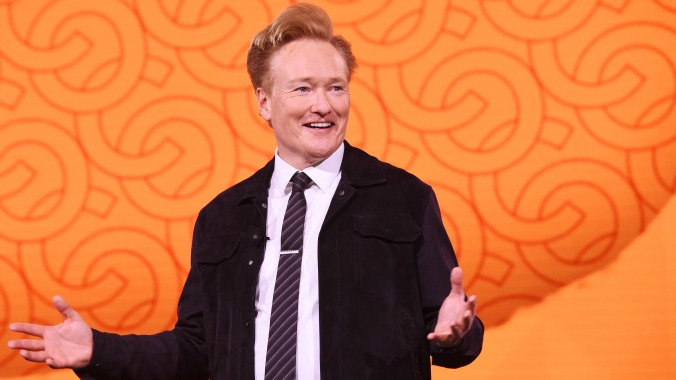What we don’t talk about when we talk about the “podcast revolution”

Let’s get this out of the way first: We’re not mad at you, Conan.
But the internet is pretty mad about the Variety cover story that dropped this week, in which Conan O’Brien (along with his Team Coco podcasting arm) is positioned as “driving the podcast revolution” in 2019. The idea that a white male comedian nine months into his audio endeavors is in any way “driving” a 15-year medium—and one largely kept afloat for many of those years by the unpaid labor of a diverse array of dedicated creators—was quickly dismissed all across Twitter, before WTF host Marc Maron took the argument to O’Brien’s TV show.
We’re accustomed by now to seeing the cycle play out: Every few months, a stalwart media outlet will decide it’s time once again to educate its audience on this burgeoning medium, and to do so, they typically trace the same tired line from iPods to iTunes to Maron to Serial to the ostensibly exciting but largely unmarketable now. Unmarketable, that is, except for content producers like O’Brien, who signed a “mid-seven-figure deal” with Midroll Media to launch his flagship podcast. (Full disclosure: The teams behind some of Conaco’s podcasting efforts are staffed by alumni of The A.V. Club’s sister publications The Onion and ClickHole.) Look at him, driving the medium forward!
It’s that sort of flawed logic that drives the podcast community up a wall. To whatever degree this medium ever enjoyed a meritocracy, increased monetization strips it away by default and by design. O’Brien was offered seven figures on the assumption that he’d produce a strong podcast—a correct assumption, but in sharp contrast with even the heaviest hitters of the medium, who must always work twice as hard to prove what they’ve done for us lately.
And Conan himself certainly doesn’t seem to think he’s revolutionizing anything. The teaser for the premiere of Conan O’Brien Needs A Friend pokes fun at how late he is to audio, joking about why he needs a podcast in the first place: “Is it maybe to show everyone else just how wrong they’ve been doing it up to now?” So it’s a little weird that the media continues to minimize the contributions of independent creators who grew the medium and the audience into something big enough for celebrities to capitalize on. Why would The New York Times lend credence to the ultra-niche term “podfade” by showcasing the rinky-dink podcasts that sputter out once the hosts learn it’s hard to sustain a series? Why frame podcasting’s anyone-can-do-it accessibility in terms of its quietest failures rather than its most notable success stories?
If there’s something that podcast reporting could use more of in 2019, it’s a good-faith estimate of the costs involved. “The most popular podcasts can make north of $10 million annually, and costs are minimal, often boiling down to renting studio space or paying someone to produce a show,” Variety explains. That’s patently untrue for scripted podcasts (both fiction and non-fiction), which must also have teams of writers, editors, voice actors, experts, field reporters, and whoever they can hire to beg listeners to rate them on iTunes—because even the most successful shows are still beholden to Apple’s algorithm. And in most mainstream stories on podcast monetization, Patreon contributions directly from dedicated fans is a phenomenon that’s all but unreported. Those Patreon numbers might be negligible when compared with Conan’s Midroll deal, but they’re entirely listener-generated and nothing to sniff at.
It’s worth noting that Variety has tweaked its headline since the kerfuffle began: O’Brien is now “tapping into” the “podcast revolution,” rather than sitting in the driver’s seat. This feels much more fair, but the outsize focus on shiny celebrity podcasts still fails to capture the spirit of podcasting as a whole. It’s a medium that has made its own modest celebrities, selling out live shows and arcane merch. But maybe that’s what traditional media can’t wrap its head around, and why podcast thinkpieces always feel 20 degrees off: It’s a corner of the market where our consumption habits aren’t predetermined by committee, and there’s no cap on how many new shows can join a programming slate. When articles fret about “podcast overload” (yes, even our own), what they might actually be worried about is a lack of traditional industry gatekeeping. They greet a seven-figure celebrity podcasting deal with open arms because, to the entertainment reporters of the world, it’s a comfortable return to form.